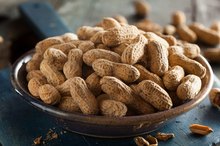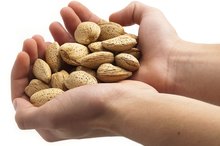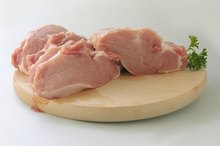What does fact checked mean?
At Healthfully, we strive to deliver objective content that is accurate and up-to-date. Our team periodically reviews articles in order to ensure content quality. The sources cited below consist of evidence from peer-reviewed journals, prominent medical organizations, academic associations, and government data.
The information contained on this site is for informational purposes only, and should not be used as a substitute for the advice of a professional health care provider. Please check with the appropriate physician regarding health questions and concerns. Although we strive to deliver accurate and up-to-date information, no guarantee to that effect is made.
Almond butter is a nutritious nut spread that can be used in the place of peanut butter. It is made from almonds, a tree nut. The almond is related to the peach and apricot family. **It contains many vitamins and minerals and can be a healthful part of the diet.
Although not high in omega 3 fatty acids, almonds are a good source of many nutrients including protein, vitamin E and calcium. They are also high in monounsaturated fat. These nutrients are good for heart health and arthritis. **
What is Almond Butter.
Almond butter is made by grinding almonds into a paste similar to that of peanut butter. It has a nutty flavor and can be smooth or crunchy in texture. It can even be made with roasted or toasted almonds and a variety of seasonings, such as honey, to give it a unique flavor.
Almond butter is generally mixed with fat or oil that can become spoiled. Store almond butter in a cool, dark place and, once opened, refrigerate.
- Almond butter is made by grinding almonds into a paste similar to that of peanut butter.
- It can even be made with roasted or toasted almonds and a variety of seasonings, such as honey, to give it a unique flavor.
Nutritional Benefits
Nutritional Value of Raw Almonds
Learn More
Adding almond butter to your diet may provide some nutritional benefits. According to the Food and Drug Administration (FDA), nuts such as almonds, peanuts, walnuts and pistachios offer many nutritional perks. Almonds are a good source of protein, vitamin E, calcium,magnesium, maganese, copper, riboflavin and fiber. They are low in saturated fat and high in monounsaturated fat.
**There is a small amount of omega 3 fatty acids found naturally in almond butter.
** Alone, almonds only have a trace of Omega 3 Fatty Acids, but when mixed with an oil to form the "butter", it's Omega 3 Fatty Acid content is increased. It is found as alphalinolenic acid (ALA), which the body converts to omega 3 fatty acids.
- Adding almond butter to your diet may provide some nutritional benefits.
- Alone, almonds only have a trace of Omega 3 Fatty Acids, but when mixed with an oil to form the "butter", it's Omega 3 Fatty Acid content is increased.
Omega 3 Fatty Acids
Omega 3 fatty acids are polyunsaturated fats, also referred to as PUFA. Your body cannot make polyunsaturated fats, so it is essential to get these fats from your diet. Omega 3 fatty acids are not only found in fatty fish, but in vegetable oils as well.
Vegetable oils that can contain omega 3 fatty acids are used in making almond butter. Depending on the oil used will determine the amount of omega 3 fatty acids found. According to The American Heart Association, the vegetable oils highest in Omega 3 Fatty Acids are flaxseed oil and canola oil 1. Avoid palm and coconut oil as they are very high in saturated fats and contain no omega 3 fatty acids.
- Omega 3 fatty acids are polyunsaturated fats, also referred to as PUFA.
- Omega 3 fatty acids are not only found in fatty fish, but in vegetable oils as well.
Different Oils Used to Make Almond Butter
Foods High in Vitamin D2
Learn More
Fat, such as oil, is added to almond paste to make almond butter. Depending on the kind of vegetable oil used, the omega 3 fatty acid content can be increased. One such vegetable oil is flaxseed oil. This oil comes from flax plant seeds and contains omega 3 fatty acids also in the form of ALA. Canola oil can also be added to almond paste to produce almond butter. This oil is the second highest vegetable oil source of omega 3 fatty acids.
- Fat, such as oil, is added to almond paste to make almond butter.
Health Benefits
Almond butter with omega 3 fatty acid may be beneficial to your health as well as tasting delicious. According to The American Heart Association, a diet high in omega 3 fatty acid can have many benefits for heart health 1. Omega 3 fatty acid can lower cholesterol and Low Density Lipoproteins (LDL). A high cholesterol and LDL level is associated with heart disease.
Omega 3 fatty acid can also reduce the chance of blood clots, thus lowering your chance of stroke.
Other health benefits to consuming omega 3 fatty acid are that they can enhance bone strength and also act as an anti-inflammatory, which can help those suffering from rheumatoid arthritis. The recommended intake of omega 3 fatty acid is 7 to 11 gm per week.
- Almond butter with omega 3 fatty acid may be beneficial to your health as well as tasting delicious.
- Other health benefits to consuming omega 3 fatty acid are that they can enhance bone strength and also act as an anti-inflammatory, which can help those suffering from rheumatoid arthritis.
Related Articles
References
Resources
Writer Bio
Victoria Goodman is a registered dietitian/licensed nutritionist in private practice. She has more than 20 years' experience in the health and wellness industry. Goodman received her master's degree in clinical nutrition from Drexel University. She has been published in "The Journal of the American Dietetic Association" and "The Cystic Fibrosis Club Abstracts." Goodman has been a contributor to various health and fitness websites since 2010.







